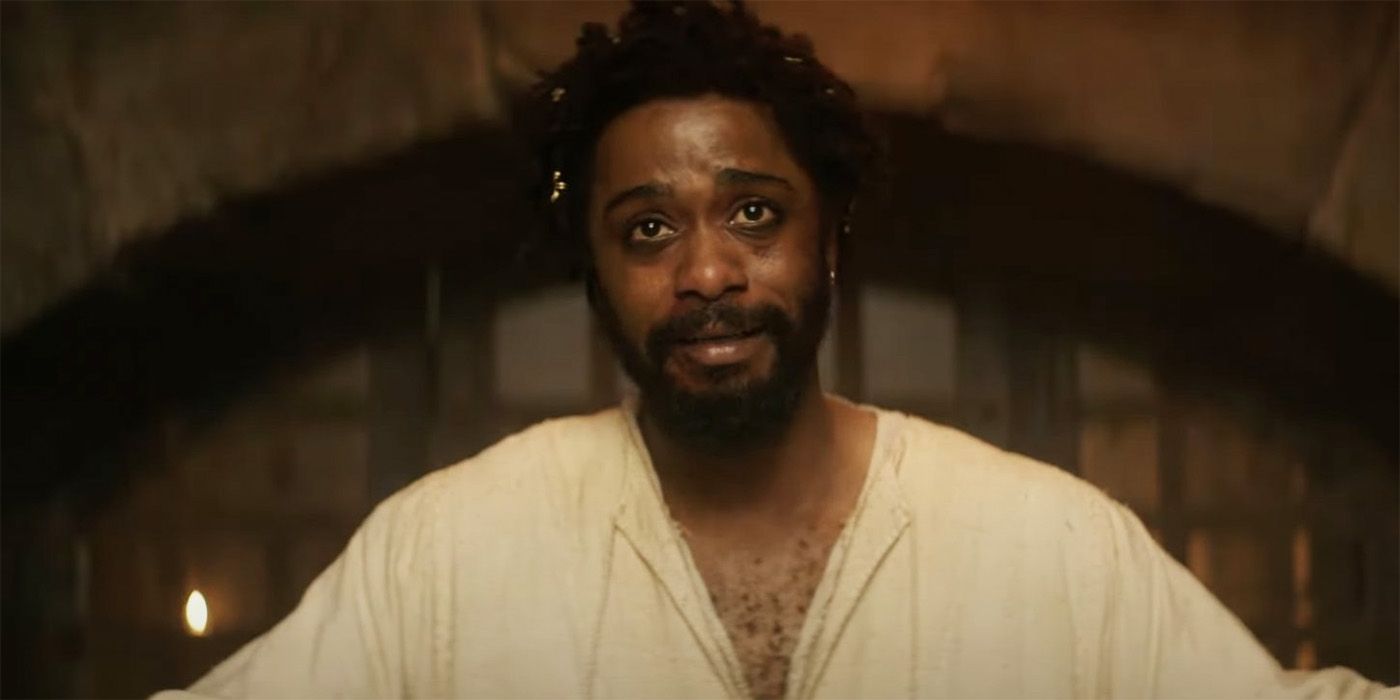
The Book of Clarence Challenges Status Quo

An insightful look into the controversial film and its portrayal of a Black Jesus
The Book of Clarence: A Film Challenging Historical Portrayals
The Book of Clarence, a highly anticipated film directed by Jeymes Samuel and starring David Oyelowo, LaKeith Stanfield, Anna Diop, Omar Sy, Marianne Jean-Baptiste, Michael Ward, Nicholas Pinnock, James McAvoy, Alfre Woodard, and Benedict Cumberbatch, has generated significant attention and controversy ahead of its wide release on January 12. At the center of this controversy is the portrayal of Jesus as a Black man, a bold and thought-provoking decision that has sparked conversations about historical accuracy and cultural representation.
LaKeith Stanfield in The Book of Clarence with candles behind him
The film unfolds the story of Clarence, a man deeply impacted by the power of the Messiah, who embarks on a journey that challenges societal norms and personal beliefs in pursuit of a divine existence. David Oyelowo, one of the stars of the film, has passionately defended the portrayal of a Black Jesus, emphasizing the importance of telling the story through the lens of Black culture and perspective. In a recent interview with MovieWeb, Oyelowo addressed the controversy, highlighting the significance of representing the Black experience in a narrative that has historically been dominated by white portrayals.
The decision to depict Jesus as a Black man in The Book of Clarence has ignited a debate about the representation of religious figures in popular media and the impact of cultural perspectives on storytelling. Oyelowo's powerful statement about the film being an opportunity to share the Black narrative with authenticity and depth has resonated with many supporters of the film, while also drawing criticism from those who are uncomfortable with the departure from traditional portrayals of Jesus.
The Controversy Surrounding The Book of Clarence
The controversy surrounding The Book of Clarence stems from the decision to cast a Black actor, Nicholas Pinnock, as Jesus, challenging the long-standing iconography of a white Jesus Christ. While historical evidence suggests that Jesus likely had brown skin, the visual representation of Jesus has predominantly been that of a white man, leading to a disconnect between historical accuracy and popular imagery.
In response to criticisms of the portrayal of a Black Jesus, David Oyelowo, in a bold and thought-provoking statement, highlighted the disparity in reactions to the casting of white actors as historical figures with darker skin tones, such as Charlton Heston as Moses and Robert Powell as Jesus. Oyelowo's poignant comparison sheds light on the historical inaccuracy and inherent racism in the criticism of The Book of Clarence's casting choice, prompting audiences to reevaluate their perspectives on cultural representation and historical fidelity in film.
The critique of The Book of Clarence's portrayal of Jesus as a Black man reflects a broader discussion about the whitewashing of historical figures in popular media and the need to challenge traditional portrayals through diverse and inclusive casting. The film's deliberate departure from the conventional depiction of Jesus aims to provoke thoughtful conversations about the impact of visual representation on cultural perceptions and the importance of embracing diverse narratives in storytelling.
Redefining Cultural Narratives Through The Book of Clarence
The Book of Clarence's bold decision to cast a Black actor as Jesus serves as a powerful catalyst for redefining cultural narratives and challenging the status quo in popular media. By centering the story around a Black protagonist and portraying Jesus from a non-traditional perspective, the film confronts the historical whitewashing of religious figures and presents an alternative portrayal that reflects the diversity and richness of cultural experiences.
The film's unapologetic approach to depicting Jesus as a Black man not only addresses the historical accuracy of religious iconography but also amplifies the voices and experiences of marginalized communities. Through the lens of Black culture, music, humor, and accents, The Book of Clarence offers a compelling narrative that celebrates authenticity and inclusivity while shedding light on the enduring impact of Christianity on Black culture and identity.
As The Book of Clarence prepares for its wide release, it stands as a testament to the transformative power of storytelling and the potential for films to challenge entrenched norms and inspire meaningful dialogue about representation, diversity, and cultural heritage. The film's portrayal of a Black Jesus sparks an important conversation about the significance of cultural perspective in shaping collective narratives and reimagining historical figures in ways that resonate with diverse audiences.








